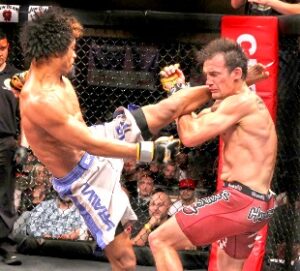
Are you wondering if UFC fighters can bet on themselves?
In this article, we’ll look at whether UFC fighters can bet on themselves, against themselves, on fights outside of their own, any instances of fighters doing so, and the potential problems of allowing UFC fighters to bet on themselves.
Contents
Can UFC Fighters Bet on Themselves?
Yes, UFC fighters can bet on themselves as it isn’t a conflict of interest. There aren’t any rules in the UFC Fighter Conduct Policy (2013), in the Official Unified Rules of MMA, or across any State Athletic Commission mentioning anything to do with fighters’ gambling on themselves when fighting.
The reason for the lack of rules and regulations regarding UFC fighters betting on themselves is that the sports betting industry only became mainstream in 2018, with the Supreme Court allowing states to freely set their own gambling laws in America.
From 1992 to 2018, Nevada was the only US state to allow sports betting.
As it’s so fresh, commissions, laws, and regulations haven’t yet established anything for or against MMA betting, so there are legal grey areas there that may cause problems in the future.
However, allowing UFC fighters to bet on themselves adds intensity to a match as it shows the ultimate level of confidence before a fight. There’s also no conflict of interest as they’re likely to try even harder to win.
As the UFC and gambling are now so connected, allowing UFC fighters to bet on themselves almost demonstrates a form of company share buybacks, where a company believes in itself and buys its own stock. This gets investors to follow suit, which in this case is fans gambling.
It would be hypocritical of the UFC not to allow UFC fighters to bet on themselves, while at the same time getting sponsored by several gambling companies such as Stake and DraftKings, and enticing their audience to gamble on fights.
It’s really no surprise that UFC fighters can bet on themselves, seeing as the UFC’s home is in Las Vegas, the gambling hotspot of America. They see gambling in fights and having fighters involved as making the sport more exciting for the fans. It’s also no secret that Dana White loves gambling.
Also, another reason UFC fighters can bet on themselves is that they’re independent contractors and not employees of the UFC. This means they’re working alongside the UFC and have more freedom than employees do.
Can UFC Fighters Bet Against Themselves?
UFC fighters aren’t allowed to bet on their opponent as it’s a direct conflict of interest and seen as match-fixing or throwing a fight.
UFC & US Law
There aren’t any UFC-specific rules against UFC fighters betting against themselves because they aren’t needed. Sports match-fixing is illegal and there are US laws prohibiting it. This also includes taking money to lose a fight or any kind of bribery and illegal gambling activity.
Not only would it be match-fixing but it would also constitute fraud as bettors are betting on a fixed fight that they think is genuine.
Based on US law, sports bribery and match-fixing have a possible prison sentence of 1 to 5 years and up to a $10,000 fine.
On top of it being illegal, the UFC Fighter Conduct Policy applies to every fighter as per their contracts. Basically, the policy says fighters will act appropriately and not do anything that reflects negatively on the UFC; which betting against themselves certainly would.
It also outlines examples of things that negatively impact the UFCs reputation, such as:
- Fraud, racketeering, or money laundering
- ‘Conduct that undermines or puts at risk the integrity and reputation of the UFC’
Based on this, it’s clear a UFC fighter betting against themselves is misconduct as it could be considered fraud, money laundering, and match-fixing; all of which undermine and put at risk the reputation of the UFC.
State Athletic Commissions
There also aren’t any State Athletic Commission rules or regulations against UFC fighters betting against themselves.
However, taken from NSAC’s regulation, section 49 discusses how MMA fighters can face sanctions or have their licenses revoked if they:
‘(b) Engages or has engaged in illegal bookmaking; (c) Engages or has engaged in any illegal gambling activity.’
Again, this is very unspecific, but the UFC and all commissions see it as common sense that professional athletes can’t bet against themselves.
Can UFC (MMA) Fighters Make Proposition Bets on Their Own Fight?
Yes, UFC fighters can make proposition bets on their own fight. There aren’t any rules or regulations against UFC fighters making proposition bets on their own fights. After emailing several State Athletic Commissions, they simply respond that the commissions are silent on the issue.
While it’s definitely legal for UFC fighters to make proposition bets on their own fight, it’s likely to be frowned upon which is why many fighters likely remain silent on these kinds of bets. It’s entirely possible for proposition bets to be seen as misconduct of the UFC Fighter Conduct Policy.
For example, if a UFC fighter has bet on themselves to win in the second round by submission and they’re evidently stalling in the first round after having a chance to finish the fight; they’re therefore not giving 100% effort to win the fight at all times.
It’s also borderline fraud because proposition bets provide information that bettors should know about.
While it remains legal for UFC fighters to make proposition bets currently, in the future there’s likely to be regulation around this issue. However, this may take some time seeing as gambling isn’t even legal in all American states, and there’s always the argument that they weren’t stalling – it’s hard to pin.
Can UFC Fighters Bet on Fights Outside of Their Own?
Yes, UFC fighters can bet on fights outside of their own as there isn’t a conflict of interest and the result of the fight is independent of their bet.
By betting on other fights within the UFC, they’re also not violating the UFC Fighter Conduct Policy as the promotion fully supports and advocates UFC betting.
Examples of UFC Fighters Betting on Themselves or Other UFC Fights
While most fighters prefer to avoid publicly revealing any bets they’ve placed on themselves or other fighters so as to not put extra pressure on themselves, there are many examples of UFC fighters betting on themselves.
Here are some examples:
Justin Jaynes (2021)
Justin Jaynes bet his entire fight purse on himself against Charles Rosa at UFC Vegas 30 in 2021. He said about his decision:
” ‘As soon as the betting line comes out between Justin Jaynes and Charles Rosa, I’m putting my entire fight contract on myself, and my coaches are doing that as well. I’m betting close to 25K that I’m winning my fight because that’s how much I believe in myself. This is all in for me, and if I lose this fight, I do not get paid and my coaches do not get paid either. And that won’t be as bad as losing my job of being in the UFC.’ “
Unfortunately, Justin lost by split decision and was later released on his birthday of all days.
Anthony Rocco Martin (2019)
In 2019, Former UFC fighter Anthony Rocco Martin bet many times over and lost thousands of dollars, saying he’ll stick to betting on himself in the future.
So in other words. I’ll stick to betting on myself. And I need a fight lmao pic.twitter.com/UL9s90TlFV
— Anthony Rocco Martin (@TonyRoccoMartin) December 16, 2019
Rashad Evans (2009)
Former light heavyweight champion Rashad Evans bet on himself at UFC 98 against Lyoto Machida but never revealed how much he put down.
Despite the confidence, Rashad was knocked out with a left hook to the chin in round 2. This is the reason why most fighters don’t reveal their bets, as it can backfire massively.
Josh Burkman (2015)
At UFC 182, Josh Burkman was a 5 to 1 underdog against Hector Lombard. Because of the great odds, Burkman backed himself to the tune of $1,000, potentially taking home $5,000 if he could execute an upset.
Unfortunately, Hector Lombard won the fight by unanimous decision, but his win was later overturned after he tested positive for the anabolic steroid, desoxymethyltestosterone (DMT).
Obviously, Josh Burkman won’t get his $1,000 back, which presents another problem with betting on UFC or MMA fights; losing out to cheaters.
Norman Parke (2014)
Norman Parke placed a proposition bet on himself to beat Naoyuki Katani at UFC FN 46 via a round 2 finish. This is exactly what happened, and in his post-fight interview with Dan Hardy, Norman told the world on a live broadcast that he’d made that bet and bagged $5,000 for winning it.
Norman was never sanctioned for such a bet because there aren’t any rules or regulations against UFC fighters making proposition bets.
Ricco Rodriguez (2002)
Ricco Rodriguez became the UFC heavyweight champion after beating Randy Couture at UFC 39 for the vacant title, but not without controversy.
For the fight, Ricco Rodriguez took a $100,000 sponsorship from the Golden Palace Casino. As part of the deal, Rodriguez had to have a henna tattoo (temporary) on his back displaying Golden Palace in capital letters.
The problem with this was, UFC 39 was being hosted at the Mohegan Sun Arena, which is a rival casino business meaning sponsorships of other casinos were prohibited.
Dana White shared how the Mohegan Sun threatened to cancel the show over the incident, which could’ve potentially put the UFC out of business back in that time when they were struggling to profit and fronting millions of dollars for each event.
In the end, they worked out a deal with them and the show continued. More interesting is how Ricco Rodriguez bet the entire $100,000 sponsorship money on himself to win as a 5 to 1-underdog. He walked away with $500,000 from gambling and just $30,000 to win and $30,000 to show for the actual fight.
Jorge Masvidal (2020)
In an ESPN interview hosted by Ariel Helwani, Jorge Masvidal said, ‘You know your boy’s a gambler, and I gamble on myself more than anything other in this world. Shoutout to those oddsmakers, thank you, I appreciate this payday.’
Luckily for Masvidal, he never revealed the amount he gambled on himself because he was easily dismantled by Kamaru Usman.
Tae Hyun Bang (2015)
At UFC FN 79 in South Korea, Tae Hyun Bang took $92,000 to throw a fight against Leon Kuntz.
Despite taking the money and planning to go ahead with the match-fixing scheme, Tae Hyun Bang won the fight via a split decision.
This was after the UFC warned all fighters on the card about their Fighter Conduct Policy, due to a dramatic swing in the odds in the run-up to the event that took Bang from a slight favorite to a huge underdog; which clearly looked like match-fixing or corruption.
Despite winning and returning the money, Tae Hyun Bang was sentenced to 10 months in prison for taking the bribe and attempting to fix a UFC fight.
Is There a Problem With UFC Fighters Betting on Themselves?
While UFC fighters and MMA fighters can bet on themselves, there’s definitely a problem with it, and one that’s likely to cause issues in the future.
A UFC fighter betting on themself isn’t a conflict of interest as they’re trying to win regardless of the bet. However, it becomes a problem when a fighter consistently bets on themself but then doesn’t bet on themself to win in a particular fight.
In this scenario, it tells bettors a fighter isn’t confident against an upcoming opponent. Whether this information should be known or not depends on if it’s seen as insider information or not, which it likely should be.
Overall, there are a lot of grey areas surrounding fighter gambling and it’s likely to cause issues in the future.
If they made all fighters’ bets undisclosed 100% of the time, this would eliminate the above problem. However, they’re unlikely to do this because they know disclosed bets (open) entice fans to bet.
Did Conor McGregor Bet on Himself?
In 2015 before his fight against Chad Mendes, Conor McGregor offered a $3 million wager to Lorenzo Fertitta and Dana White that he’d knock out Chad Mandes in the second round.
Both Lorenza and Dana declined the wager, which is lucky for them as McGregor did in fact stop Mendes in round two. It’s unknown whether or not Conor McGregor bet on himself against Mendes.
It was also reported that Conor McGregor would bet 1 million Euros on himself to beat Floyd Mayweather, but the bet was never confirmed.
Can State Athletic Commission Officials and Staff bet on UFC or MMA Fights?
Anyone working for a State Athletic Commission can’t bet on UFC or MMA fights.
The purpose of State Athletic Commissions is to provide rules and regulations and keep an MMA event as safe and clean as possible.
Therefore, anyone from the commission betting on a UFC or MMA match would constitute a conflict of interest that could be seen as fraud, match-fixing, bribery, or any other illegal gambling activity.
Anyone directly involved with commission work is an employee and therefore must remain separate from gambling on an event they regulate. Especially judges, referees, ringside physicians, or any commissioner who interacts with fighters and has a huge influence on the result of a fight.
The Bottom Line
So, ‘can UFC fighters bet on themselves?’
Yes, UFC fighters can bet on themselves as it isn’t a conflict of interest. A fighter is trying to win regardless of whether a bet is made. UFC fighters betting on themselves means they’ll put in more effort to win as there’s more on the line.
On the other hand, UFC fighters most certainly can’t bet on their opponent as it’s a conflict of interest and would be seen as a fraud, match-fixing, bribery, and misconduct as described in the UFC Fighter Conduct Policy – on top of the fact it’s illegal under US law.
They’re also allowed to bet on UFC or MMA fights outside of their own, as there isn’t a conflict of interest and the results are independent of their bet.
Finally, UFC fighters can also make proposition bets on their own fights as there aren’t any rules or regulations within any State Athletic Commission which say otherwise.
In the future, it seems almost inevitable there’ll be rules and regulations made surrounding proposition bets as they’re definitely on the borderline of a conflict of interest and fraudulent gambling activity.




